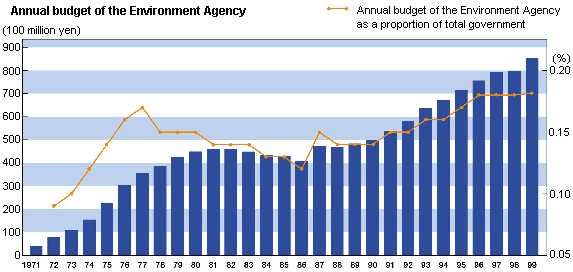Environmental Policy
Environment Agency's Policy Focus for FY1999
The economic and social systems we have developed in the 20th century, centered on mass production, mass consumption, and mass disposal, have proven to have limits. Today, we face an array of unsolved environmental problems, including global climate change, widespread chemical pollution, and the environmental stress due to waste. To tackle these problems, the Environment Agency is undertaking a variety of measures aimed at gradually transforming our current way of life into a sustainable one. The following six measures are the pillars of this initiative. (Total budget: 86 billion yen)
1. Shaping a socio-economic society capable of solving global environmental problems:
13.3 billion yen The Environment Agency will work to develop strategic and comprehensive measures to counter global warming by putting in place systems that promote lifestyles that do not stress the environment. Also, to prepare for the United Nations World Summit on Sustainable Development ("Rio+10") to be held in 2002, the agency is working on international initiatives that promote greater dialog and international cooperation on environmental policies with other nations.
2. Preventing chemical pollution by dioxins, endocrine disruptors, etc.:
6.3 billion yen In order to dispel the anxiety felt throughout Japan about the problems of dioxins and endocrine disruptors, the government must take urgent action. Orchestrating the entire government responses, the Environment Agency will introduce and promote measures to quickly raise the level of knowledge on these issues to clear up the uncertainty currently surrounding them. The agency will also set up a system to manage the environmental risks of chemicals.
3. Reducing air pollution in cities:
2.8 billion yen Despite existing measures, ambient air quality in cities remains a serious situation, due to the air pollution and noise caused by motor vehicle traffic. The Environment Agency plans to introduce tougher, more comprehensive measures to improve ambient air quality in cities, including tightening controls on vehicle exhaust emissions. The agency will also impose stricter controls on suspended particulate matter (SPM) levels, which have not been meeting the reduction target levels set by the agency. The new measures will aim to bring SPM levels down in line with these targets.
4. A new recycling system and sound water cycle:
2.7 billion yen The Environment Agency is currently investigating the construction of a recycling system for converting waste materials into various recycled products. In connection with this, the agency is evaluating a variety of advanced technology and working to develop an improved database on recycling information. Also, in cooperation with related ministries and agencies, the Environment Agency is focusing renewed efforts on maintenance and conservation of natural water cycle.
5. Promoting closer coexistence between nature and humans:
19.5 billion yen Through its Green Census, the Environment Agency is collecting basic data to help preserve biological diversity over the entire country, including wilderness areas and marshlands. The agency will also undertake a broad range of projects to promote closer contact with nature and more effective wildlife management.
6. Compensation and prevention of pollution-related health damage:
21.2 billion yen The Environment Agency is steadily putting in place policies designed to protect people from pollution-related health threats, and to support people who suffer health problems caused by exposure to pollution. Especially, in accordance with the Cabinet agreement in December 1995, the agency is continuing to help victims of Minamata Disease.
